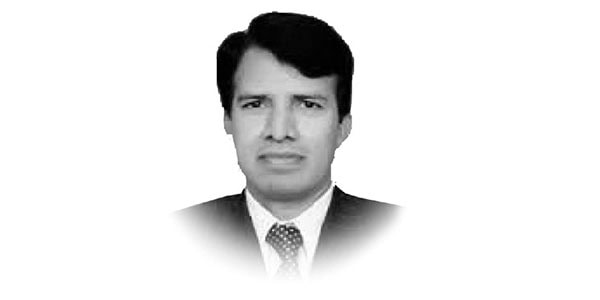Questioning economic management of Pakistan
A good economic management and deliverance of good governance is said to be the start and end of everything in a country.
Indeed, the strong economy is the source of national strength and form the basis for a knowledgeable and resilient work-force of a nation.
Unfortunately, despite heavy taxes and exceptionally high levies on all goods and utilities in Pakistan, there have been downward trends in the economy of Pakistan since 2018.
Despite being an agrarian economy, the essential food items are rapidly getting out of the reach for over 50% Pakistanis.
Inflation is record high and developmental sector is found wanting in all areas of socio-economic development of the state.
The educational budget of the institutions of higher education and public sector colleges and schools has been reduced to minimum level in last four years.
Indeed, not the resources but the poor economic management and bad governance is considered to the real cause of deteriorating economy of Pakistan.
Primary responsibility of the precious government was to identify and prioritize the problems facing the state and society of Pakistan.
Identifying the problem areas at an early time-frame and focusing to resolve them by all possible means and through better economic management could have saved the state from on-going economic crises.
But, neither the problems identified nor any serious efforts were made to overcome the economic crisis.
Once confronted by financial challenges, the government resorted to rush to IMF for a possible rescue which provided money with heavy interest rates and pre-conditions like impositions of heavy taxes and levies on to the masses.
In 2019, IMF provided 39-months loan to Pakistan under the Extended Fund Facility (EFF). It was a total of $6 billion loan provided to support economic reform programme of Pakistan.
Despite this loan facility of IMF and other loans from many friendly countries, previous Government could neither reform the national economy nor did provide relief to masses.
Rather, the foreign loan has risen to $129 billion and people are facing extreme economic crisesunder high taxes and increased levies. In 2018, Pakistan’s external debt was $93.531 billion and $86.031 billion in 2017.
These figures are sufficient to demonstrate the real picture of the performance of previous Government.
Though the GDP of the country was shown over 3 per cent for the fiscal year 2021/22 yet the economic state of the country remained extremely uncertain as of April 2022.
It is worth mentioning that, for the first time in the history of Pakistan, its GDP growth was negative (0.38% for the fiscal year 2019-2020).
The federal budget 2020-2021 was based on assumptions and presumptions and so was the engineering made with budget estimates for 2021/22. The outcome of this budget is now hitting-hard to everyone in Pakistan.
The GDP growth rate for fiscal 2017-2018 was over 4.5% which means it was better economic management until 2018.As per IMF, “Pakistan’s external debt is likely to reach $138.568 billion in 2022-23 up from $129.574 billion in 2021-22.
The domestic debt is also projected as Rs29.901 trillion for fiscal year 2022-23. Hope Prime Minister ShahbazSharif would make a difference to through a better economic management.
It is worth mentioning that in 2017 inflation rate was 4.15% which was further reduced to 3.93% in 2018. The inflation had risen to 6.74% in 2019 and reached to its peak (12.50 %) in March 2022.
In addition, poverty is all time high in Pakistan where number of poor people is increasing with each passing day as food items and basic necessities of life are beyond reach of common man.
This is the actual and grim economic situation facing the state of Pakistan where provinces and institutions are unable to manage their annual expenditures.
Similarly exchange rate of PKR versus US Dollar (1 USD=182 PKR) is highest in the history of Pakistan.
It remained almost constant from 2013 to 2018. Indeed, the government and its economic managers responsible to manage state’s economy could neither appreciate the looming financial crises nor took timely measures to avoid the financial meltdown of Pakistan.
Resultantly the country is heading towards an economic disastrous which means a lot for the nuclear state like Pakistan.
While the national economy of Pakistan is sliding downwards, there has been unprecedented mushroom growth of the various cartels in Pakistan.
These cartels are controlling the prices and supply of all-most all critical food items and petroleum with or without consent of the government.
Indeed, government has become hostage to these cartels; some of them were part of the previous government as sitting ministers, MPs and advisors.
Despite investigations and proofs against their deliberate kick-backs and corruption, causing heavy losses to national economy and undesired short supply of items in the market, they were never put through unaccountability.
In October 2021, through a new Ordinance of Accountability they have been given total impunity to legalize their corruption and losses they caused to national economy.
This NRO was specifically meant for the government ministers, cartels and those indirectly funded them and their private projects including hospitals and other organizations.
What an economic management by the previous government and its highly qualified and IFIs owned and trained teampushed the country towards economic devastation.
For the Government of Prime Minister Shahbaz Sharif, the suggested way forward is; undertake a massive restructuring of the economic team of Pakistan through serious, innovative and revolutionary steps with positioning of home-grown economic managers who are well versed with national economic potentials of the state of Pakistan.
Let’s do-away with imported economic and security advisors in any future scenario.
— The writer is Professor of Politics and IR at International Islamic University, Islamabad.










